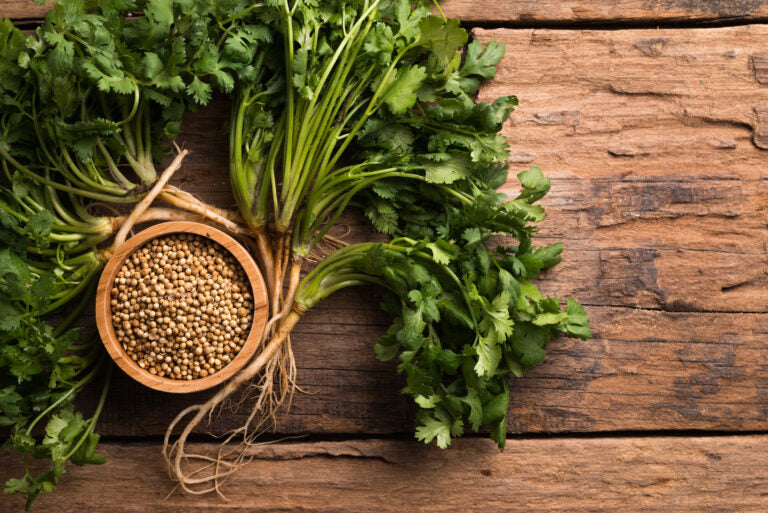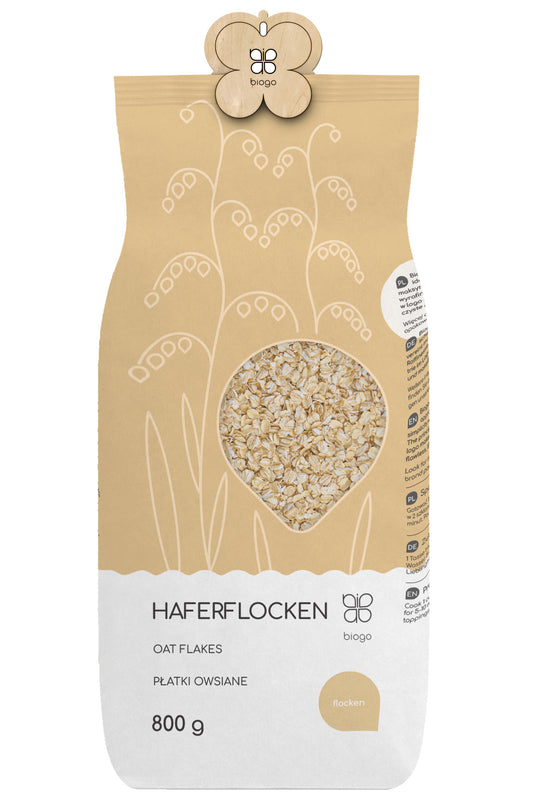Contents:
- What properties does coriander have?
- Health-promoting uses of coriander
- Use of coriander in the kitchen
- Are there any contraindications to using coriander?
Coriander is an annual plant in the Apiaceae family. It is used primarily in cooking, but not exclusively. It is a valuable source of many vitamins and minerals essential to our bodies, such as vitamins A, K, and C, as well as potassium, magnesium, and calcium. Both its leaves and seeds are used in cuisines around the world, particularly in Asian and Middle Eastern cuisine. Its health-promoting properties were particularly recognized in Asia, where it has been used in traditional folk medicine as a remedy for digestive problems, bacterial and fungal infections, and more.
What properties does coriander have?
Coriander is valued not only for its flavor, but also for its richness in many nutrients and biologically active compounds. These include:
- Vitamins - K, A and C,
- Minerals - iron, potassium, calcium, copper, manganese and magnesium ,
- Antioxidants – help neutralize harmful free radicals in the body that can contribute to the aging process and the development of many diseases: quercetin, kaempferol, ruthenin and apigenin.
- essential oils: linalool and geraniol, they give a characteristic smell and taste, have antiseptic, anti-inflammatory and antibacterial properties,
- Fiber – helps regulate digestion,
- Phenolic compounds – have strong antibacterial and anti-inflammatory properties,
- Protein – although coriander contains small amounts of protein, it is worth mentioning as it is a rare ingredient among spices.
Health-promoting uses of coriander
Although coriander is a spice, it is believed to have a number of health benefits, including:
- antibacterial – supports the fight against various infections,
- Supports the proper functioning of the digestive system – helps relieve stomach problems: bloating, cramps and indigestion,
- helps regulate blood sugar levels, which is beneficial for people at risk of diabetes,
- protects neurons and supports the proper functioning of the brain,
- supports the proper functioning of the heart – lowers the level of “bad” LDL cholesterol,
- is a rich source of antioxidants and helps neutralize harmful free radicals in the body.
- Supports skin health – it is used in skin care products and is helpful in treating acne thanks to its anti-inflammatory and antibacterial properties.
Use of coriander in the kitchen
Fresh coriander leaves look a bit like parsley. Their fragrance is intense and their flavor unique: herbal, slightly lemony, and slightly spicy. They are an essential addition to Latin American, Asian, and Middle Eastern cuisine. The seeds are often added to curry spice blends and bread.
Fresh cilantro leaves look a bit like parsley. In Mexican cuisine, cilantro leaves are an ingredient in ceviche, tacos, and guacamole, among other dishes. In Asian dishes, cilantro is used in soups, salads, curries , and rice dishes, as well as in Thai pad Thai. Cilantro is also used in popular Middle Eastern dishes such as hummus and falafel. Ground coriander seeds are added to curry spice mix. In some cultures, cilantro is used to prepare traditional drinks such as Indian lassi. You can also find cilantro as an addition to delicious Georgian dumplings – khinkali. We can treat cilantro leaves like parsley, although they are not similar in taste, for example, by adding them to traditional soups (it is especially suitable for pumpkin cream soup and various broths), to which they bring a new, fresh, oriental flavor and aroma. It goes well with pork ham, beef, and lamb. It is also an excellent addition to chicken curry, pork goulash, and vegetable and meat fillings.
Are there any contraindications to using coriander?
Although both coriander leaves and seeds are generally considered safe, there are certain situations in which you should be especially careful when using them, such as:
- Pregnancy and breastfeeding: Due to insufficient safety data, use in large quantities in pregnant or breastfeeding women is not recommended.
- Liver disease – Coriander contains compounds that can be harmful to the liver. People with liver disease are advised to use this spice in moderation or after consulting a doctor.
- Allergy: Some people may have an allergic reaction to cilantro. Symptoms may include: rash, itching, swelling, difficulty breathing, or sneezing.
- Taking anticoagulants: Coriander may reduce blood clotting, so people taking anticoagulants should consult a doctor before including coriander in their diet.
- low blood pressure – coriander also lowers blood pressure,
- Surgery – due to coriander’s effect on blood clotting, it should not be taken for at least 2 weeks before the planned surgery.
THE PUBLISHER'S CHOICE
Dried dates 1 kg BIOGO
- €4,21
€4,95- €4,21
- Unit price
- / per
Peeled sunflower seeds 1 kg BIOGO
- €3,04
€3,57- €3,04
- Unit price
- / per
Dried organic mango 400 g BIOGO
- €10,99
- €10,99
- Unit price
- / per
Dried White Mulberries 500 g ORGANIC
- €5,84
€6,87- €5,84
- Unit price
- / per
Organic Ground Turmeric 500 g BIOGO
- €5,92
- €5,92
- Unit price
- / per
Oat flakes 800 g BIOGO
- €2,34
€2,76- €2,34
- Unit price
- / per
Milk thistle seeds 1 kg BIOGO
- €3,99
- €3,99
- Unit price
- / per
Popcorn (corn kernels) organic 1 kg BIOGO
- €5,84
- €5,84
- Unit price
- / per
Organic cashew nuts 1 kg BIOGO
- €19,99
- €19,99
- Unit price
- / per
Unpeeled buckwheat groats 1 kg BIOGO
- €2,81
€3,31- €2,81
- Unit price
- / per







































































































































